









A new year Bulletin that is packed with lots of different events and write ups. The main event before Christmas was the Winter party which is a joint event with DJL but in reality was organised almost entirely by DJL committee and helpers. We are, as ever grateful, for their skill and enthusiasm without which I think that we, DDLS members, would be a pretty unsocial bunch – thank you DJL.
In this Bulletin there is Affinity Law as our firm in focus, news from Rothera Bray and also the exciting news that Lisa Haythorne of the Derbyshire Law Centre was appointed an MBE in the King’s New Years Honours list. If you have news from your firm that you would like to share in the Bulletin please e-mail it to me.
The next Tapas Thursday, kindly sponsored by One Search, is 30th January at Lorentes Darley Abbey. Tapas Thursday’s take place every quarter and if you know of anyone who would interested in sponsoring one of these well attended informal lunches for local business people please let me know. The ever-popular
quiz will be at Derby RFC on Wednesday 26th February and at the time of writing I have 14 teams entered already so if you are planning to attend book your place asap. The Annual Awards Dinner is Friday 21st March at Pride Park. Tickets are selling well. Remember that the early bird offer is only until 21st February. After that tickets will go up to £75 each. There will be a raffle for SV2 and if anyone is able to provide a raffle prize please let me know.
Look out for the regular e-mails with details of other upcoming events. There is a mediation/ ADR course on 17th March, crazy golf on 13th February and pizza and prosecco on 24th April. All events are available to book through Fienta. com-ddlsevents.
The Derby School Debate Competition is well underway and thank you to all those members who are giving up their time to help with the judging. The Final will be at the University of Derby Law School on Tuesday 2nd April to coincide with the visit of Richard Atkinson, President of the Law Society, who is helping judge. Anyone is welcome to come and watch but please let me know beforehand.
Nomination forms for the Awards have been sent out several times but please let me know if you need it re-sending. The categories are
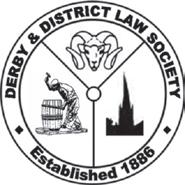
Lawyer of the Year, Junior Lawyer, Lifetime Achievement, Commercial Lawyer and Apprentice/ SQE/ Trainee. Shortlists will be announced in early March with the winner being revealed at the Dinner. Nominations need to be with me by 7th February.
A plea from Manesha Ruparel who is Secretary of the DEI sub-committee for new members –please e-mail her on mr@aandco.co.uk for more information. Also Fiona Apthorpe, Secretary of the Family sub-committee, asks that you please let her have the names and e-mails addresses of your family lawyers so that she can update her list and ensure that you receive important communications from Court etc that she is often asked to circulate. fiona.apthorpe@geldards.com
We are saddened to hear of the passing of HHJ James Orrell and there will be a tribute to him in the next edition. There will be a Valedictory at Derby Crown and County Court on 7 February at 9.30am. Everyone is invited to attend.
I hope to see you at an event soon.
Take care.
Julia Saunders admin@derbylaw.net
01283 734989
Officers
President*
Tina Attenborough
Attenborough Law, Derby Tel: 01332 558508 tina@ attenboroughlaw.co.uk
Vice-President*
Lucy Tissington lucy.tissington@familylawgroup. co.uk
Immediate Past President*
Oliver Maxwell
Eversheds Sutherland 01332 378696 o.j.z.maxwell@gmail.com
Deputy Vice-President*
Rachel Maxwell Rachel.maxwell@smithpartnership. co.uk
Honorary Secretary*
Fiona Apthorpe
Geldards LLP, Derby Tel: 01332 378335 Fiona.Apthorpe@geldards.com
(* = Ex-Officio)
Parliamentary Liaison Officer
Julie Skill, Elliot Mather LLP Chesterfield Tel: 01246 231288 julie.skill@elliotmather.co.uk
Public Relations Officer (+) Vacant
Derby Junior Lawyers
Laura Matthews laura.matthews@geldards.com
Amelia Sutcliffe amelia.sutcliffe@ smithpartnership. co.uk
George Ottewell George.Ottewell@flintbishop.co.uk
Constituency Council
Representative, Derbyshire (+) Shama Gupta shama.gupta@freeths.co.uk (+) attend Committee by invitation
Other Committee Members
Julie Skill, Elliot Mather LLP Chesterfield Tel: 01246 231288; julie.skill@elliotmather.co.uk
Felicity Coats felicity.coats@elliotmather.co.uk
Diana Copestake Tel: 0845 2725674 dianaohalloran@aol.com
David Hardy Tel: 01332 842008 david.hardy1630@gmail.com
Martin Salt martins@simpsonjones.co.uk Tel: 01332 200200
Claire Twells claire.twells@smithpartnership. co.uk
Sue Jennings sue.jennings@geldards.com
Treasurer*
Ben Lawson
Elliot Mather LLP Tel: 01246 231288 ben.lawson@elliotmather.co.uk
Claire Rudkin
Flint Bishop, Derby Tel: 01332 340211 claire.rudkin@flintbishop.co.uk
Manesha Ruparel MR@AandCo.co.uk
John Ellis John.ellis@smithpartnership.co.uk
Solicitors’ Benevolent Assoc. area representative Peter Lord 9 Larkhill, Swanwick DE55 1DD Tel: 01773 541753
Administrator / Bulletin Editor
Julia Saunders, Email: admin@derbylaw.net
Sub-Committees (Secretary in italics)
Criminal Litigation Andy Cash Felicity Coats felicity.coats@elliotmather.co.uk
Andrew Oldroyd (01332 225225)
Education & Training Sue Jennings, & all Sub-Committee Secretaries
Employment and Business Law Sue Jennings
Tina Attenborough tina@attenboroughlaw.co.uk
Equality, Diversity and Inclusion Manesha Ruparel mr@aandco.co.uk
Tina Attenborough tina@attenboroughlaw.co.uk
Sue Jennings sue.jennings@geldards.com
Family Law FionaApthorpe
David Guthrie dg@aflp.co.uk
Fiona Apthorpe Fiona.Apthorpe@geldards.com
Fiona Lazenby fiona.lazenby@knightsplc.com
Julie Skill Julie.Skill@elliotmather.co.uk
Kelly Mower kellym@eglegal.co.uk
Liz Guyler lizguyler@eglegal.co.uk
Lucy Tissington lucy.tissington@familylawgroup. co.uk
Manesha Ruparel MR@AandCo.co.uk
Melanie Bridgen melanie.bridgen@nelsonslaw. co.uk
Natalie Haydon-Yeung Natalie.Haydon-Yeung@geldards. com
Nick Herbert nh@aflp.co.uk
Ruth Jones ruth.jones@smithpartnership. co.uk
Sole Practitioners’ Group (SPG) Tina Attenborough tina@attenboroughlaw.co.uk
Last updated 08.10.24

Welcome to the December/January edition of the DDLS bulletin, I sincerely hope that everyone enjoyed a well-rested but merry Christmas and a happy new year!
Where has the time and the year gone, our own Christmas was a relatively quiet one spent with my sister and family in Northamptonshire, a trip to Cornwall in between and back to Derby for a wonderful New Year’s Eve spent with friends at their beautiful home nearby and I now eagerly await what 2025 has in store for us all.
It’s been a quiet few months professionally, but being more than half way through my tenure and reflecting on 2024, I am really pleased to look back on the fantastic events our society have been able to put on including the Golf Day, Summer Soiree, the Legal walk and Bake off all of which saw our members come together for great causes, the Tapas Thursday Networking events, which have been a huge success and continue to be hugely popular.
The numerous training events, delivered by our Conveyancing and Family law sub committees, including the De-mystifying Advocacy training delivered by KC Peter Joyce have all been well attended, the latter being so oversubscribed that Julia had to find a large capacity venue. It is usual for training to be described as enjoyable, but
this was the overall feedback from those that attended.
The Winter Party, with a hog roast and live entertainment, was another thoroughly enjoyable pre-Christmas event, held at the Farm House Hotel on Ashbourne Road, again thank you to all that made the effort to attend, but special thanks go to the amazing DJL who organised it admirably, in particularly to Amelia Sutcliffe who managed the event brilliantly!
I would like to congratulate and welcome (my daughter) Laura Matthews to her new post as President of the Derby Junior Law Society, to Amelia who takes over the role as Vice President and to George Ottewell (District Judge Cochrane’s grandson) who takes over as Deputy Vice President of the Derby Junior Lawyers!
The word got out that Laura and I would cross over with our respective presidential years and the Law Society have asked us if they could write a piece about it in their national gazette, so do look out for that in the coming months.
I was also fortunate enough to make two trips to our wonderful Cathedral during the latter part of 2024, the first when I was honoured to attend the legal lunch at the Museum of Making followed by the High Sheriff’s Legal Service in October, which lead to yet another ‘first’, having my photo appear in the Derbyshire Life Magazine, and the second when I was asked to give a reading for the Courts legal service in December. Honours that I will always remember and treasure, but most of all having the opportunity to meet some really interesting people.
I was also recently invited by both Birmingham and Nottinghamshire Law Societies, to take part in their Awards process, so I have spent several days going through the numerous nominations for special recognition within our legal communities. It has been thoroughly inspiring to see what so many of our counterparts are doing in their own regions and communities in their daily lives, and I have no idea how some candidates fit in all of their
extra activities, going above and beyond in so many areas of their work and life.
Another high was having the opportunity to meet with and interview Tom Clowes, the Managing Director of (some would say our football team saviour’s) Clowes Developments Ltd about his love of Derby and of course Derby County, as part of getting to know our Derby (Business and Community) Dignitaries. These interviews have given me such an insight into the thoughts and private lives of those that serve and look after our wonderful city and I’m so grateful to them all for taking the time to engage with us. Please take the time to read the interview in this Bulletin.
We have our own Annual Awards Dinner fast approaching in March, so please don’t forget to get your nominations in for Derby and District’s own special people that deserve recognition within the legal community, I believe the closing date is 14th February next!
Law Society Bicentenary - We have been selected by the Law Society to host a regional visit from our national President Richard Atkinson on 2nd April next. Further details about the day and you could get involved will be provided by our Administrator, Julia Saunders in her regular emails, in due course.
Tapas Thursday Networking - A reminder that tickets are selling fast for our next event, there are limited spaces, so if you don’t want to miss out, get on Fienta for your tickets for our next Tapas Thursday, taking place at Lorentes in the Darley Abbey Mills on 30th January next.
Finally, on a very sad note, on behalf of both myself and the Derby and District Law Society, I would like to offer our heartfelt condolences to the family of HH Judge Orrell, who sadly passed away on 13th January. The funeral has not yet been arranged but will be notified in due course, for anyone who would like to attend.
Tina Attenborough President, 2022-23

1 Derby has some admirable plans for its immediate and longer-term future, do you have any thoughts about them?
I’ve always said that Derby has been overdue it’s ‘renaissance’ and for one reason or another it’s just never quite happened compared to other cities. With the delivery of a few key sites within the city I think this could start the wheels turning. One of which is the Friar Gate Goods Yard Scheme which Clowes Developments were directly involved in. This will not only bring more people to live in the city, but repurpose the listed buildings on site which are such an important part of Derby’s railway heritage.
2. What do you love most about Derby?
I’ve often thought of Derby as a big village, primarily because to have a city with such a close-knit community is rare. If you don’t know the answer to something, you’ll likely know someone that does (especially useful for me!). It would be remiss of me not to mention Derby County, I always knew it was something that brought the City together but it wasn’t until our involvement that I was humbled by just how important it is to the community and we’re honoured to be it’s most recent custodians.
3. On your journey to the top who would say has influenced you the most and how has that person’s influence shaped your leadership style?
I’ve been lucky enough to have worked under some great people in my life and if I’m honest some great teachers from my time at Ecclesbourne School (sadly you don’t appreciate that until you’re older!) I’ve worked for people that are frightening, those that are placid and ideally you want to be somewhere in between. But my mother always said that if you can show a degree of empathy to people then you can’t go far wrong and I’ve always tried to work in that manner.
4. What do you love the most about your role at CDL?
The people. A cliche answer perhaps but the role of MD has put me in front of a lot of interesting people outside of the business but this extends further than those in industry. We have a number of charitable endeavours and we sponsor a couple of sports teams outside of Football and the stories I’ve met via these means have been humbling. I consider myself lucky to be able to offers these types of support in my role as MD and seeing the fruits of our inputs, however modest.
5. What is the biggest impact your company’s developments have had on the city and local business?
Outside of the obvious (DCFC) the group has held a number of properties within the City centre for a number of years (even decades) waiting for the right time to bring these
There was a great turn out from lawyers, junior lawyers and students for this interesting course from Peter Joyce KC of High Pavement Chambers Nottingham. Thank you to everyone who attended, the University of Derby for hosting us and of course Peter himself who is pictured here with Past President John Calladine

forward. With the City Council in tow we’ve been able to bring forward a number of these properties (Friar Gate Goods Yard included) and get them into the right operators hand’s. This is an ongoing process that will hopefully compliment others developments in the City such as the newly opened Becketwell Scheme by SJS. I’m also pleased to have finally delivered the old Railway sidings site at the Wyvern retail park which is now a Marks and Spencer’s, a prominent site and the first thing a lot of people see on their approach to Derby from the A52.
6. Given your success in business/life, would you mind sharing your top 3 life hacks or lessons for our readers?
I have nothing particularly profound but here’s a few things I try and live by:
• People are only as good as the instructions they’re given.
• Hold fast and trust your instincts, but there’s nothing wrong with a u-turn when presented with new information.
• One thing I always say to the younger surveyors when they’re networking (especially when there’s drink involved) is not to get too hung up on knowing everything, just be pleasant and approachable. Most people can do the job you want them to do for you, it’s finding someone you like doing it with is they key for me.




Gold Patrons of the Derby and District Law Society Oberoi Business Hub are dedicated to supporting local law firms by delivering exceptional call-handling services.
Many local firms already trust Oberoi to act as an extension of their team, ensuring seamless communication with their clients.
In this bulletin, we feature Carol Andrews, a key member of Oberoi’s call-handling team, who shares her insights and personal approach to delivering tailored services that meet the unique needs of law firm
What’s your career background?
I’ve worked in various industries including telesales, advertising, banking for personal and business, customer services, owning a bar, litigation, retail, and factory work. My diverse experience has allowed me to develop skills that are useful for call handling services, such as communication, problem-solving, and customer service.
How long have you worked with Oberoi Business Hub?
I’ve been working with Oberoi Business Hub for over 5 years now. It’s been a great experience, and I’ve learned a lot about call handling and customer service during my time here.
How do you prepare when a new client comes on board?
When a new client comes on board with us, our team leader liaises with the client to determine how they want us to answer and manage their calls.
Whether that be emailing or texting the message direct to the client or live transferring the call to the appropriate staff member. Last new we invested in new IT systems that are perfectly aligned to ensure seamless service delivery.
Time is allocated to train each team member who is responsible for handling the client’s calls.
In addition I make sure to actively train myself and search for information about the company to familiarise myself with their specific requirements. This helps me provide tailored call handling services that meet their expectations and needs.
What information do you need to do your job?
To do my job effectively, I need to know the basics about the company, such as who they are, what they do, and what their specific requirements are for call handling. This helps me handle calls in a way that reflects their brand and meets their customers’ needs.
We are effectively an extension to the client’s team so we accrue an in-depth understanding of each and every law firm client, including their structure, senior partners, number of fee earners and the areas of law that they specialise in.
The most important information is how the client wants their calls to be handled.
This determines whether we transfer the calls to individuals, go through to fee earners directly or their secretaries first or whether they prefer to be emailed with the caller’s

contact details and details of their enquiry.
We ensure our systems are always up to date with individual’s names, roles, working days and times as well as updates about holidays or when they are unavailable for any reason which is important to provide an efficient service.
How do you handle challenging calls?
Handling challenging calls requires active listening and patience. I make sure to listen carefully to the caller’s needs and concerns and provide them with the best possible solution or advice. If I’m unsure of how to handle a specific situation, I consult with my team members or the client to find a resolution.
What reports/logging information do you provide to your law firm clients?
At the end of each day, our system provides our law firm clients with a detailed call log that includes information such as who the caller wanted to speak to, the nature of the call, their contact details, and the time of the call and who from the Oberoi team took the call. This helps our clients gain a comprehensive overview of their business and identify any potential issues or areas for improvement.
Our clients love our end of day reporting. By analysing the nature of the calls that are coming through on a daily basis, our clients gain a comprehensive overview of their business which they would not necessarily achieve otherwise.
For instance, it can highlight bottlenecks in the business ie: whether certain departments are receiving a larger than average number of calls and the reasons why
What do you most enjoy about your job?
What I enjoy most about my job is the variety of companies alongside law firms and people we deal with on a daily basis. It’s always interesting to learn about new industries and help our clients provide excellent customer service to their customers. Additionally, working with my colleagues at Oberoi Business Hub is always a pleasure, and we work together as a team to provide the best possible service to our clients.



You may have seen in the news the recent closure of the Nottingham Courts as they were too cold. This meant cases were moved around and had some impact on Derbyshire Crown Court cases which actually fall under the Nottinghamshire boundaries.
The delays in the Crown Court are extensive, more cases then ever are being sent up to the Crown Court, we are listing trials in late 2026, not only falling outside this years financial year but also the next one too!
Some good news for criminal practitioners
across the country in December was the introduction of a slight increase in the police station fees. For Derbyshire it meant there was no fee increase for one police station (Ripley) and only a £20 increase per case for the other, but something is most certainly better than nothing. More notably there was a bigger increase in the youth court work to attract a more specialist approach to it, that will in due course add significant value to that sector and the ability to fund proper training for those that delve into the youth court.
As always most defence practitioners,
and those who deal with the Magistrates Court regularly, will tell the same tale of the administrative backlog which makes communication grind to a halt, I am not sure that will be changing any time soon. Over Christmas there very high volumes of remand cases in the Courts, which made the occasional court days extend out to full days, and even siting past 5pm to make sure all the prisoners were dealt with. Not sure the issue of prisons being full is stopping anyone!
Felicity Coats
Elliot Mather
DDLS were pleased to be able to sponsor the refreshments at the Carol Service which raised funds for Derby Food for Thought Alliance. The event was really well attended and there were some great carols from the safeguarding choir and a reading from our President, Tina Attenborough.



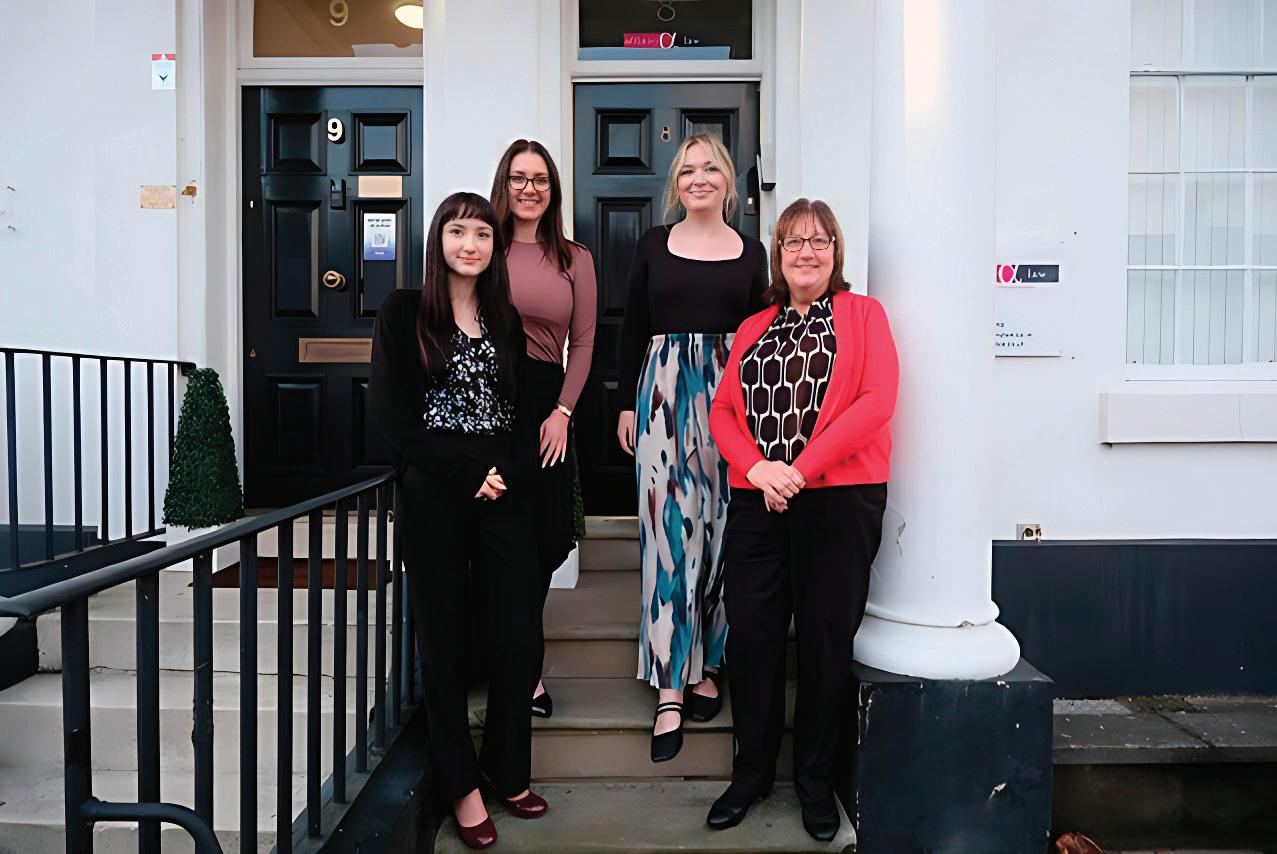
Affinity Law is a niche personal injury and clinical negligence firm, representing victims of all types of injuries from across the country. The firm, based in Derby and Leicester, specialises in catastrophic injury cases such as traumatic brain injuries, amputations, spinal cord injuries and much more, as well as high-value Court of Protection matters for those who have lost financial capacity as a result of either illness or injury.
Affinity Law’s story began in 2008 when Nicola Kitchener and Sue Roberts , the firm’s directors, set up a law firm with the mission to make a difference to people’s lives affected by injuries that were not their fault, from the mildest to the most severe. The name Affinity Law was chosen to reflect the affinity we have with our clients.
Affinity Law prides itself on offering a personal service to our clients from the outset. We answer every call without a voicemail system to ensure that our clients, many of whom are going through the most difficult time in their lives, hear a friendly and understanding voice at the other end of the line. It is this personal touch that helps us to build such positive, strong and long-lasting relationships not only with our clients, but their families too. Our clients are at the heart of everything we do, and this is evidenced through our client retention, with many of our recommendations coming from previous clients, and our 193 5-star Google reviews.

2018 marked a very exciting chapter for Affinity Law when it welcomed Debra Morris to open its second office in Derby. Debra had worked at top ranking personal injury law firms in and around Derby for many years before joining Affinity Law where she impressively opened the first and only branch of the firm outside of Leicester. Alongside her extensive experience in dealing with complex and catastrophic injury claims, Debra is also appointed by the Court of Protection to act as a professional financial deputy for individuals who lack capacity. This means we are able to support more clients than ever before,
all of whom are at different stages of their life post-injury. Debra has more than 30 years’ experience working in personal injury and has secured well over £35 million for her clients since then. She is proud to be recognised as a specialist Head Injury Solicitor by the national charity Headway, and as an Accredited Brain Injury Specialist and Senior Litigator by the Association of Personal Injury Lawyers. She was also named Lawyer of the Year by the Derby & District Law Society in 2024.
At Affinity Law, we are committed to achieving the best possible outcome for all our clients in the hope of enabling them to live fulfilled and independent lives post-injury. As well as getting the best financial compensation for our clients, we will work alongside case managers, neuropsychologists, physiotherapists, occupational therapists, support workers and other professionals to help them get the care and support they need. We have fostered connections with professionals throughout the brain injury community on both a national and local scale, including The Derby Head Injury Team and Nightingale Hospital, allowing us to secure timely initial assessments in order to progress recovery, as well as local brain injury charities such as Headway Derby.
Though a lot has changed since Affinity Law’s inception in 2008, what hasn’t changed is our mission. For over a decade, we’ve been working tirelessly to make a difference to people’s lives that have been devastated by injuries that weren’t their fault, both through financial compensation and access to first-class rehabilitation and support post-settlement.


Prominent East Midlands restructuring and insolvency expert joins Rothera Bray
Rothera Bray has expanded its team with the appointment of Insolvency and Corporate Recovery specialist Nicky Calthrop-Owen. Nicky joins Rothera Bray as a consultant based at the Lace Market office, bringing a new area of expertise by offering dedicated insolvency and restructuring services to the firm.
A highly regarded restructuring solicitor, Nicky is renowned for her contentious litigation and advisory work in the insolvency and corporate recovery arena. Her track record includes involvement in some of the East Midlands’ largest restructuring cases. She has consistently been recognised as a ‘leading individual’ by the prestigious Legal 500 and Chambers legal directories. Most recently, she was named in the 2024 Legal 500 Hall of Fame and has maintained her ranking in Chambers and Partners UK Midlands Restructuring/Insolvency for an impressive 20 years.
Nicky brings a wealth of experience advising clients in complex insolvency and restructuring matters. Her portfolio includes high-profile referrals where directors and stakeholders have sought her counsel to navigate intricate challenges, achieve optimal outcomes, and ensure compliance with legal obligations. Over the years, Nicky has acted for insolvency practitioners and stakeholders nationwide, delivering substantial recoveries for creditors who have suffered significant losses.
Further enhancing her exceptional credentials, Nicky has acted in the peer-to-peer and alternative finance sectors, representing lenders and Security Trustees in recovery actions and complex fraud cases. Additionally, she has advised professional partnerships on their obligations and risks in insolvency matters and provided counsel in partnership disputes.
Nicky’s appointment follows a series of strategic moves by Rothera Bray this year, including the arrivals of Corporate Partner David Kaplan
and Dispute Resolution Consultant Kendal Litherland in April and May, respectively, as well as the launch of a new licensing team in May and the firm’s merger with Massers Solicitors in October.
Commenting on her appointment, Nicky said:
“I’m delighted to have joined Rothera Bray and am looking forward to working with them to develop the restructuring and insolvency expertise at the firm to complement their continued strategic development.”
Christina Yardley, CEO of Rothera Bray, commented:
“We are thrilled to welcome Nicky to the team. Nicky’s exceptional reputation and unparalleled experience make her a perfect fit for our firm. Her ability to navigate complex matters and deliver results aligns with our commitment to providing the highest quality legal services.
“Nicky’s appointment, alongside our other key hires and our recent merger, represents our unwavering focus on innovating for the benefit of our people and clients.”
For more information about Rothera Bray Solicitors, visit: https://rotherabray.co.uk/
Rothera Bray celebrates 200 years of legal excellence with special event in Nottingham

Rothera Bray, a firm with roots stretching back to 1824, has launched its 200th-anniversary celebrations in style with an event hosted at St Mary’s Church in Nottingham’s historic Lace Market. Attended by over 200 clients and contacts, the evening marked the beginning of a year of celebrations for the firm, reflecting its proud history of legal service and community impact.
The event featured a festive-themed charity cocktail bar, raffle, and vibrant disco. Entertainment was provided by Rock Choir, performing a mix of popular Christmas songs and contemporary hits. The evening also raised an impressive £2,224 for Nottingham Relief in Need (St Marys), a local charity with which Rothera Bray

works closely to manage its administration and ensure its impactful work continues.
Nottingham Relief in Need (St Mary’s) was established in 1975 through the amalgamation of 26 historic Nottingham charities, some dating back to 1524. The charity provides essential support to individuals and organisations in need, offering grants to provide essential items such as cookers, washing machines, beds, or carpets. Mark Chowdhury, Trustee of Nottingham Relief in Need (St Mary’s), expressed his gratitude for the partnership and support:
“I would like to thank you on behalf of the Trustees of Nottingham Relief in Need (St Mary’s) Charity for allowing us to be part of such a fabulous evening to celebrate Rothera Bray’s bicentenary.
What a marvellous sum raised. These funds will be used to help some of our city’s neediest citizens by allowing us to provide them with an ‘essential’ item, like a cooker, a washing machine, a bed, or carpet. The generosity of the guests and colleagues who attended the event will have a big impact on these people’s lives.”
Founded in 1824 by John Wadsworth when he began his legal career as an attorney on Fletcher Gate, Nottingham, Rothera Bray has maintained deep ties to the city for two centuries.
The Rothera family’s contributions to Nottingham’s legal history are extraordinary, spanning generations and including the landmark Nurse Waddingham case in 1936. Most recently, the firm has expanded through strategic mergers, including the acquisition of Derby-based J.H. Powell in 2022 and its mergers with Leicester-based Bray & Bray in 2023 and Nottingham firm Massers Solicitors in 2024.
As part of its bicentennial celebrations, Rothera Bray has launched the 200 Deeds that make a Difference initiative, a community-driven programme aimed at leaving a lasting positive legacy through charity partnerships, pro bono work, and environmental projects.
Christina Yardley, CEO of Rothera Bray, commented on the momentous occasion:
“It’s a privilege to lead a firm with such a remarkable history and strong connection to Nottingham. This anniversary is not just about reflecting on the past but looking to the future, ensuring we continue to deliver exceptional legal services while making a meaningful impact in our communities.”
For more information about Rothera Bray Solicitors, visit: https://rotherabray.co.uk/

Full-time; 3+ years’ PQE
Join a long-established legal firm in Derby and become part of a committed and enthusiastic team. You will represent clients at the police station and Magistrates’ Court on a wide variety of matters, some being complex and requiring detailed knowledge of the relevant law.
Key Responsibilities
• Represent clients during police station interviews and at Magistrates’ Court hearings
• Prepare cases including doing legal research and drafting documents
• Oversee the day-to-day running of the department, ensuring compliance with LAA requirements
• Undertake file reviews
• Participate in out of hours’ rota for police station attendance
• Requirements
• Qualified Solicitor with 3+ years’ PQE
• Good advocacy experience
• Duty Solicitor accreditation or the willingness to become accredited
• Police Station accredited

• Ability to communicate well and give clear advice whilst having empathy towards the client
• Knowledge of legal aid billing or willingness to become proficient
• Further Details
• 25 days’ annual leave plus bank holidays
• Hours: 35 hours a week 9 a.m. – 5 p.m. Monday to Friday plus out of hours’ rota
• Out of hours work paid at the current rate set by the partners
• Salary according to experience
If you are interested, please contact Christopher Gabb (CMG@ ewlaw.co.uk) (01332 348484) for an informal discussion. For an application form please contact:
Matthew Zolkiewicz (mz@ewlaw.co.uk)
Eddowes Waldron Solicitors 12 St Peter’s Churchyard Derby DE1 1TZ
The annual joint Winter Party of DDLS and DJL took place on 22nd November 2024, a frosty, snowy Friday in the Folly at the Farmhouse at Mackworth. As ever, ticket sales were initially slow but by the night we were joined by 90 attendees from both local legal and business communities, to celebrate the start of the festive season together.
We are grateful, as ever, to the committee of Derby Junior Lawyers for their enthusiasm and skill in planning such a fantastic event.
All enjoyed welcome drinks kindly sponsored by MRN Solicitors – The Costs Experts, before tucking into a gorgeous hog roast buffet. After a brief introduction from John Ellis and Tina Attenborough, we were provided some insight into what our two chosen charities for the event – YMCA Derbyshire and SV2 –Supporting Victims of Sexual Violence. Across the evening we raised £700 for charity, thanks to Catriona Smedley and Sophie Haywood’s efforts with the raffle.

Just before the partying began, we heard from our headline sponsor, Greg Gillespie from Legal Connect. A specialist business development agency who works with UK law firms to attract more clients, increase brand awareness and provide more value to their customers. Enabling firms with their content creation at no extra cost. Huge thank you again to Legal Connect for their continued support.
Thank you to everyone who was involved with the evening, both organising and attending. We hope that you enjoyed yourself as much as we did, and we look forward to seeing you at an event soon’.
Amelia Sutcliffe, Smith Partnership

























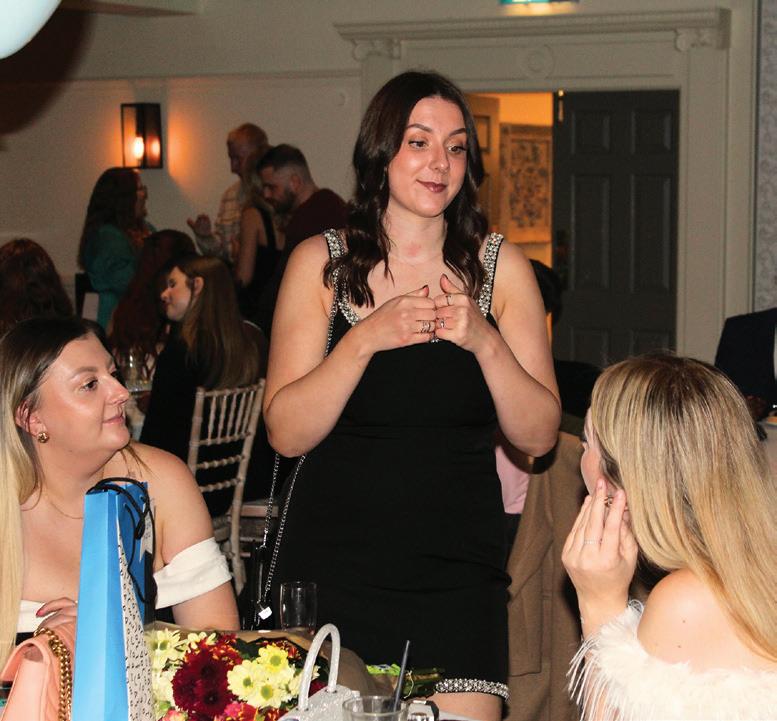



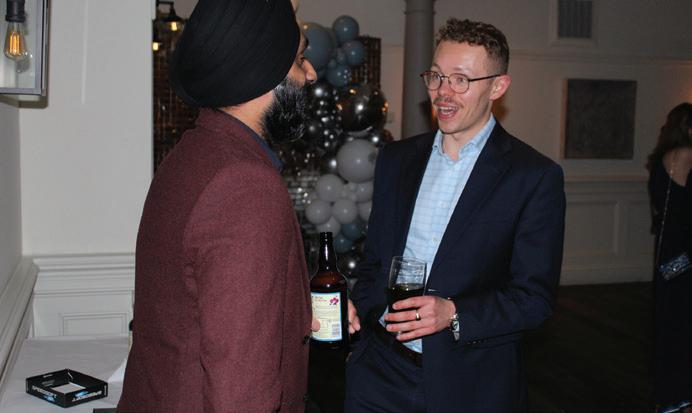












Commentary
This case concerns an important boundary matter that sometimes arises for orthopaedic experts in relation to biomechanics and ergonomics. These are areas of expertise for which the orthopaedic surgeon’s ‘working knowledge’ may be sufficient, thereby avoiding the time and expense of instructing a further expert just as in cases where knowledge and experience of orthopaedics in general is sufficient and it is not necessary to instruct an orthopaedic sub-specialist.
Learning points
• In a case where biomechanical or ergonomic issues may arise, it is advisable to explain your knowledge of the subject or subjects.
• Indicate that you will, if you consider it advisable, recommend the instruction of a biomechanical expert or ergonomist and, if appropriate, defer to them.
• Be in a position to give evidence about possible causation in specific situations relevant to the instant case.
• Be in a position to provide references to studies showing a correlation between load and injury.
The case
The pursuer’s case was that she suffered loss injury or damage as a result of the defender’s fault and negligence. She was employed as a production operative at Mathiesons Bakery in Larbert. To succeed, the pursuer was required to prove that she was engaged in a manual handling operation, that there was a foreseeable risk of injury, and that she was injured by the operation.
History
On 31 May 2020, the pursuer was primarily engaged in work on the production line. On that day, she was instructed to collect twelve trays of cream for use on the production line. The trays were to be collected from a window next to the production line, which formed part of the sanitiser tunnel within the defender’s production plant. Each tray contained a ten litre bag of cream. Each tray was plastic and a little wider than the pursuer’s body. The pursuer picked up each tray at about hip or waist height and lifted it to almost level with her shoulders. Her
arms were slightly extended in front of her. The trolley was to the pursuer’s left hand side at 90 degrees to the window from which she was collecting the trays. The purser lifted around eight or nine trays and stacked them in turn on a flat trolley. The pursuer immediately felt pain in her back after lifting the ninth or tenth tray from the window. The pursuer continued to work and took all twelve trays to the production line. The following day when the pursuer got up for work she was unable to get out of bed immediately and fell to the floor when she tried to do so. The pursuer was absent from work for three months and her symptoms resolved within six months.
Her skilled witness was a consultant orthopaedic surgeon. His evidence was that, if the court accepted the pursuer’s evidence of lifting trays approximately 10 kg in weight from waist height to shoulder height on a trolley to her left resulting in pain in her back, he considered that to be a mechanism that could cause the pursuer to suffer injury.
The skilled witness explained that in the course of studying for the FRCS examinations, there were a number of modules on basic sciences including biomechanics dealing with the operation of the spine, lower limbs, hands, knees and arms. In his evidence in chief he agreed that there was a risk of injury if a female lifted a weight of 10 kg from a low height to shoulder height with her arms partly outstretched. This was evident from basic mechanics and how a load is applied. If a load is at close distance to the spine, if the arms are outstretched the load is further from the spine and the greater the loading on the spine as a result. Risk of injury could be reduced by reducing the load, the height, or the distance away from the spine. That would include not lifting as high or as heavy a load.
In cross-examination, the skilled witness said that the higher the load, the higher the relative chance of injury. He was not immediately in a position to provide references to a study showing a correlation between load and back injury, but referred to health and safety regulations which were very clear about load and risk.

So far as foreseeability was concerned, the defender submitted that the skilled witness did not give evidence about the threshold load for the risk of injury and did not give evidence about height and distance in relation to risk. It was submitted that the court required to have evidence about what lesser load and/or height would have avoided injury.
Counsel for the defender submitted that biomechanics and ergonomics are both recognised bodies of knowledge and are separate from the core specialism of the pursuer’s skilled witness, a consultant orthopaedic surgeon, notwithstanding that in the course of studying for the FRCS examinations, there were a number of modules on basic sciences including biomechanics. It was submitted that the issue really was one for an ergonomist which the pursuer had attempted to introduce but with which she had decided not to proceed.
The sheriff, having regard to the skilled witness’s training in biomechanics, was satisfied that, in principle, and subject to the ground being laid in evidence, he was qualified to give evidence about risk of injury in carrying out lifting at least at the level of principle as to whether certain types of lifting activity carry foreseeable risk of injury. The problem, however, was that the sheriff was not satisfied on the evidence he heard that the skilled witness was in a position to give evidence about possible causation in specific situations. For example, at what carried weight would the risk of injury in a particular lift be more than de minimis; or again, how many repetitions of a particular lifting operation would give rise to a foreseeable risk of injury, and it was evidence at that level of detail which was wanted and required.
The sheriff’s finding was that the pursuer did not suffer loss injury or damage as a result of the defender’s fault and negligence.
Link to the judgment: https://www.scotcourts. gov.uk/media/gmrpnrrk/2024scedin43agnieszka-swierzko-against-mathiesonsbakery-limited.pdf
Keith Rix



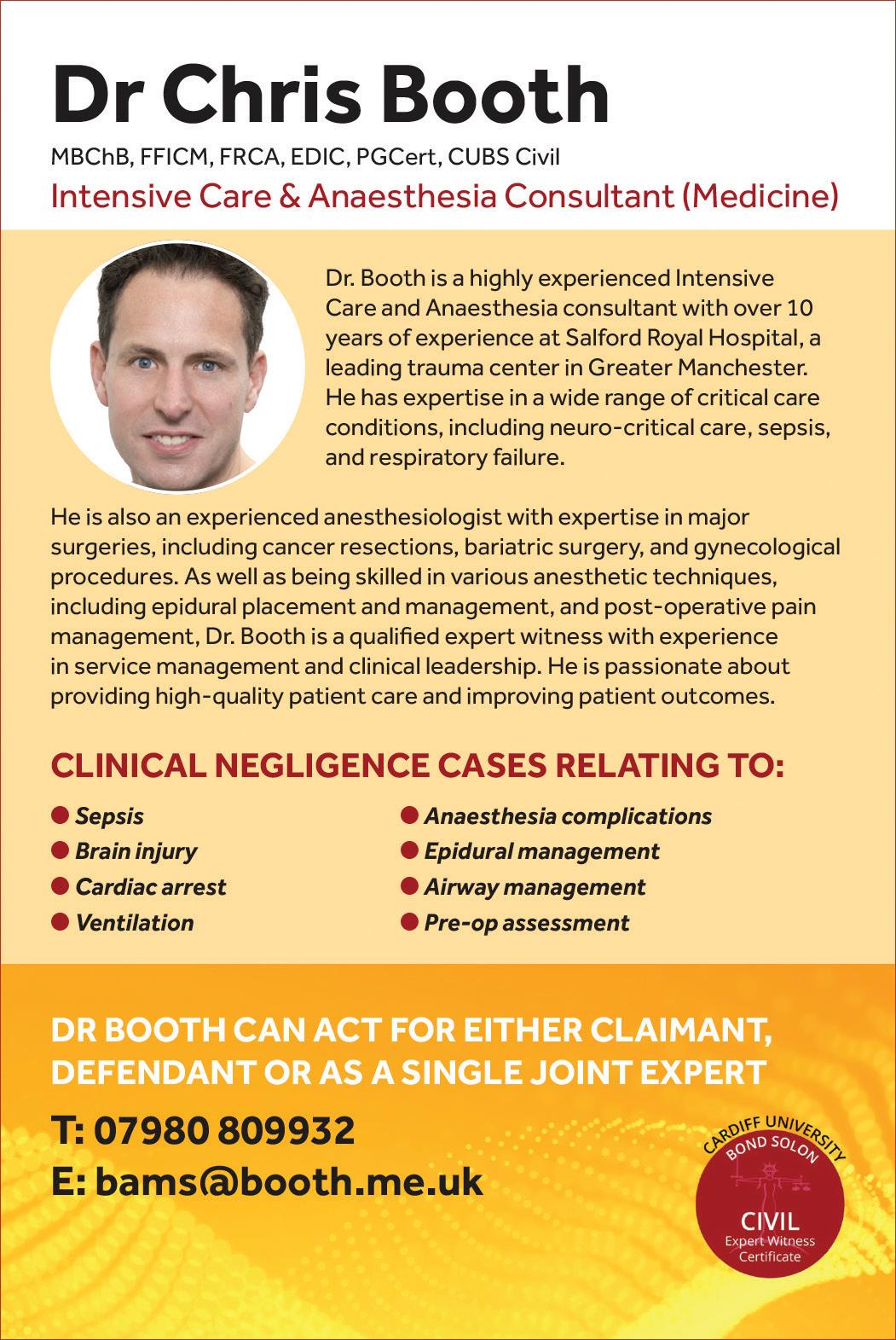

In a recent article for the legal press (Reputation or a life?) I expressed the view that in some organisations, even where lives are at risk, the powers that be think it is more important to preserve the reputation of that organisation than to protect the health, or even the life, of those they should be caring for. Examples: the infected blood scandal, Lucy Letby, many other scandals of atrocious “care” in hospitals (Morecambe Bay?) and even the topical scandal of the teenage sex grooming gangs, though that had strong overtones of social cohesion, of revealing that the perpetrators came almost exclusively from one section of society. Enough said.
But by far the best example of preservation of the organisation’s reputation has to be the Post Office scandal, where subpostmasters went bankrupt, committed suicide, were jailed when pregnant, and so on. This is a scandal which will run and run; the actions of the Post Office management were truly horrendous and egregious, and there will still be more to be said even after Mr Bates has received his compensation (along with his knighthood, well earned).
Today I want to talk about another aspect of the Post Office, the fact that they were empowered to carry out private prosecutions.
Sir Keir Starmer, the son of a toolmaker, scholarship pupil at (the private) Reigate Grammar School, was the head of the Crown Prosecution Service when some of these ill-based prosecutions took place. Several of them were authorised and pursued by the CPS, so Sir Keir must have known about them, and there was perhaps a lack of curiosity; but they were only a handful. Most of the prosecutions were conducted by the Post Office itself.
How can that be so? Well, the Post Office or its predecessor the GPO has been handling their own prosecutions ever since it was founded by Charles II in 1660, and in general they have managed those cases very well. Remember the Great Train Robbery in 1963? A private prosecution. So it seems the process did not suffer from weakness of the Post Office acting as investigator, prosecutor, jury and judge all in one.
Other organisations do their own prosecutions, too: National Trust, the railway companies (though recent pursuit of minor fare dodgers doesn’t impress), Civil Aviation Authority, RSPCA. And it seems to work very well.
There has to be a place for private prosecutions and, indeed, any individual may prosecute any other. There is also the question of money (what a surprise!) since, due to budget cuts at the CPS and in the justice service generally, it has been said that the test of a successful prosecution by the CPS has been stiffened as funds have become tighter. It surely can’t be right that more criminals should be allowed to escape prosecution because the CPS is short of funds.
So private prosecutions can work well, but what happens if those in authority at organisations which can do these prosecutions are malign?
The Post Office has it all, and rules will be bent if, returning to my theme, those in charge think it is essential to preserve the good reputation of the organisation even at risk of bankrupting or killing those they should be caring for.
The Post Office case has so many examples, so many “lessons to be learned”, and they keep tumbling out. It is years since I read The Great Post Office Scandal, the book written by Nick Wallis, and things were bad enough then, but a great deal more has come out in the public enquiry. I have listened to some of the closing addresses at the public enquiry, and to revisit what happened to Lee Castleton, to Seema
Mistra and to many more, in full knowledge of the senior people at the Post Office, is truly shocking.
I am very much looking forward to the report in a few months’ time, to what Sir Wyn Williams has to say about the shocking things he has learned.
But this is all unique to the Post Office; it is not a justification for the abolition of private prosecutions. The frequency of private prosecutions by those who have a triable case must not rely on the funds available to the CPS.
Biog: Chris Makin has practised as a forensic accountant and expert witness for 30 years, latterly as Head of Litigation Support at a national firm. He has given expert evidence about 100 times. He also performs expert determinations.
Chris is a fellow of the Institute of Chartered Accountants where he has served on the Forensic Committee, and as an ethical counsellor; he is a fellow of the Chartered Management Institute, a fellow of the Academy of Experts where he serves on the Investigations Committee, and a mediator accredited by the Chartered Arbitrators. He practises as a mediator, from his home in West Yorkshire and his rooms at 3 Gray’s Inn Square, London WC1R 5AH, telephone 020 7430 0333. He has mediated 100+ cases so far, on a huge range of subjects, with a settlement rate to date of 80%. For more see his website with videos:
www.chrismakin.co.uk chris@chrismakin.co.uk

Email:


Legacy Futures has published findings from its most recent Legacy Monitor, the legacy giving consultancy’s quarterly research programme. The Legacy Monitor compiles data from a consortium of 81 of the UK’s leading charities, representing almost half of the charity legacy market, to analyse the current state of the legacy market.
• Legacy income reported by consortium members in the latest year to June 2024 was up +1% on the previous year.
• Income growth has been driven by an increase in the number of bequests (gifts in wills), up 7% since last year, reaching 62,100 bequests.
• The growth in bequests is primarily a result of continuing improvements in the probate process at HM Courts and Tribunals Service, which is continuing to process more grants than applications, reducing the backlog of cases.
• Average gift values for residual gifts have fallen slightly by 2.5% to £64,400
due to the cooling housing market.
• Pecuniary (fixed monetary) gift values continue to remain static as they have done for the past year.
The legacy performance data was compiled using responses provided by the Legacy Monitor’s consortium members, together with wider economic research.
Ashley Rowthorn, CEO of Legacy Futures, said: “Looking ahead, the increase in bequests from probate and a more optimistic outlook on house prices lead us to expect the legacy market to remain resilient, with modest growth through the rest of 2024.
“This is encouraging news for the charity sector, which has faced significant challenges in recent years due to the cost-of-living crisis and delays in probate. The stability we’re seeing in the legacy giving forecast enables charities to plan more confidently for the future, making decisions and laying out


strategies with a degree of insight into how legacies are predicted to perform.”


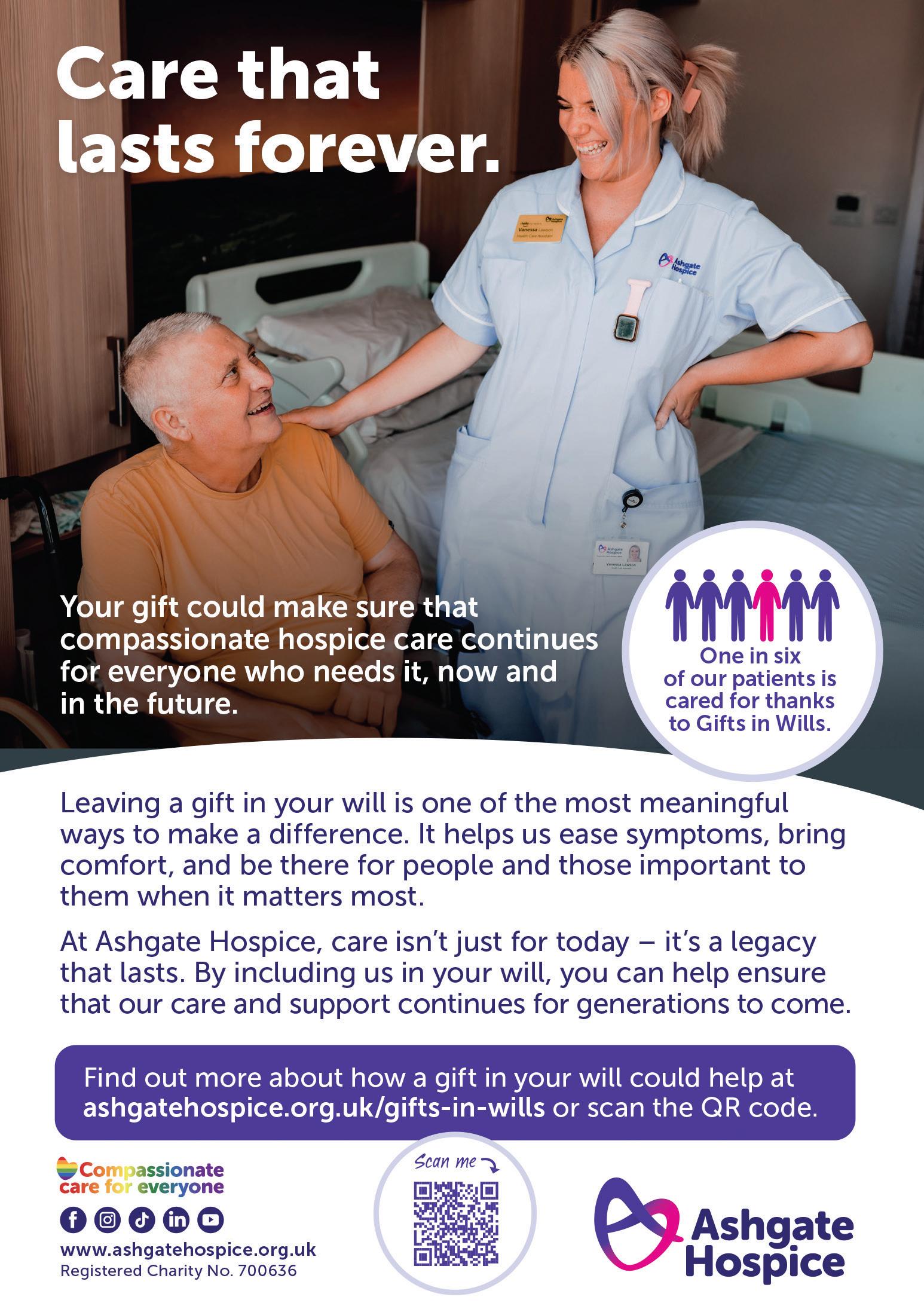

Marina Jones, Executive Director, Development and Public Affairs at English National Opera and London Coliseum, shares key takeaways from recent legacy benchmarking research of arts and cultural charities.
If music be the food of love play on Starting a summary of a legacy benchmarking research with a quote from Twelfth Night about love feels appropriate. Whether it be the love of music, dance, painting, plays - this passion is the reason why so many supporters leave gifts in their Wills to arts and cultural charities. Their dedication is profound – with one pledger delaying a long-awaited hip replacement operation to see his favourite artist perform. Legacies have been described as a love letter to the future.
So, what did a recent benchmark of fundraisers at arts and cultural charities show about us about the legacy landscape today?
78 arts and cultural charities from small regional charities to national household names took part in this survey in the last quarter of 2024 aiming to give the sector a sense of where it was.

What were the headline figures?
• 78% had received a legacy
• The biggest legacy was £4.7m and the smallest £25 – so a huge range!
• 50% have of organisations had only ever had money but others had been left items in wills including paintings, archival material, musical instruments and even a tiara.
• For half of the charities legacy fundraising was just part of someone’s job. This contrasts with many large mainstream charities that have whole legacy teams specialising in marketing, acquisition or legal. Only one arts charity had a full time member of staff dedicated to legacy fundraising, and only 5% of fundraisers responsible for legacies even had legacies in their job title. Research has shown that having legacies in the title makes it easier for donors to know who to talk to about legacies.
• Unsurprisingly perhaps, those that had training felt more confident that those who had not had training, but only 17% had specific legacy training.
• 45% of arts fundraisers have been to a donor’s funeral.
• had training felt more confident that those who had not had training, but only 17% had specific legacy training.
• 45% of arts fundraisers have been to a donor’s funeral.

RESTRICTIONS ON THE USE OF LAND A Practitioner’s Handbook
2nd Edition
By William Webster and Robert Weatherley
ISBN 978 0 85490 303 0 WILDY, SIMMONDS & HILL PUBLISHING www.wildy.com
Why there should be restrictions on the use of land: webster & weatherley offer sage advice
The second edition of this accessible book for practitioners explains what is meant by “restrictions on the use of land”. It remains a single up-to-date reference work written by experts in the field (to coin a phrase!) William Webster and Robert Weatherley. The authors discuss a broad range of public and private law topics which directly impact on the use and development of land and will interest professionals and the wider public.
The publishers are Wildy, Simmonds and Hill Publishing and we cannot thank them enough for these excellent practical guides which make our professional lives so much better with the advice given. “Restrictions on the Use of Land” is a broad subject which includes new chapters on wayleaves, planning enforcement, and trees and hedgerows.
The 2024 edition covers significant recent case law including the following five areas of English land law relevant for the counsel and solicitors:
EASEMENTS: Regency Villas Ltd v Diamond Resorts (Europe) Ltd [2018] UKSC 57 (a case discussing the four essential requirements of an easement), together with some recent authorities on prescription, such as Hughes v Benefice of Frampton-on-Severn, Arlingham, Saul, Fretherne & Framilode [2021] UKUT 184 (LC).
TOWN AND VILLAGE GREENS: TW Logistics Ltd v Essex County Council [2021] AC 1050 (the post-registration rights of a landowner and the interplay with the so-called ‘Victorian Statutes’) and R (Bellway Homes Ltd) v Kent County Council [2022] EWHC2593 (trigger events under s.15C of the Commons Act 2006).
PUBLIC RIGHTS OF WAY: DPP v Ziegler [2021] UKSC 23 (the interplay between a person’s right to protest and the obligation not to obstruct the highway) and R (Monckton) v Staffordshire County Council [2022] EWHC 3049 (Admin) (judicial review in the case of a modification order before it was confirmed).
RESTRICTIVE COVENANTS: Birdlip Ltd v Hunter [2016] EWCA Civ 603 (the prerequisites for a building scheme) and Fearn v Board of Trustees of the Tate Gallery [2023] UKSC 4 (a
case which involves a modern restatement of the law of private nuisance in the context of visual intrusion).
OF COMMUNITY VALUE: Banner Homes Ltd v St Albans District Council [2018] EWCA Civ 1187 (a case discussing the meaning of ‘actual use’ in section 88(2)(a) of the Localism Act 2011) and R (TV Harrison CIC) v Leeds City Council [2022] EWHC 130 (Admin) (a judgment which cites from four decisions of the FTT)).
We found the book tremendously practical, and it will be of interest to law students and graduates as well as practitioners. Webster and Weatherley must be congratulated on researching such an important and vital area of land law where clients often misunderstand what they can and cannot do with their own land. The new edition sets the record straight on the use of land as we enter, potentially, a new era of land law reform under a new Labour government.
The date of publication of the paperback second edition is cited as June 2024.
A Transactional Analysis
Fifth Edition
Consulting Editor Chris Hale
ISBN 9781 787 429 734
Globe Law and Business Ltd www.globelawandbusiness.com
Central to the world of Corporate finance and m&a... The new ‘private equity’ is out Now -- in a new fifth edition
As is typically the case with each of the distinguished publications from Globe Law and Business, this wide ranging, erudite and detailed discussion of private equity has now been published in a new fifth edition, having become the definitive work in this area of finance, commonly referred to as ‘venture capital.’
Practising lawyers in this area -- as well as those reading law, not to mention private, or corporate investors -- will find this new, up to date edition for 2024, an essential purchase and a fascinating read as well.
For those not entirely familiar with this continually expanding area of investment, the introduction alone is a revelation. And anyone involved either directly or indirectly with private equity will find the scope and quality of the research and consultancy contained in this book most impressive and very likely indispensable.
For convenience and clarity, the book’s
consulting editor, Chris Hall points out that ’private equity’ is synonymous with ‘buy outs’ -- and lists its four basic elements:
• investments in unquoted companies
• equity capital by nature
• medium to long term; and
• targeted at companies with growth potential
These, it is stressed, are merely the key elements, as the topics discussed are various and wide ranging -- from fund structures and debt finance to issues relating to due diligence, governance and much more.
The convergence of this often complicated subject is revealed within the book’s 576 pages and very impressive it is, as is the book’s international perspective. Very useful that -as it covers, for example, the Benelux countries, France, Germany, Italy and Spain, preceded by the chapter on “Private equity deals in the United States -- separated from the United Kingdom by a common language.”
“Separated?” Well -- not exactly. But one could argue either way. What is not arguable is that at the moment, it is the US and UK which dominate internationally in the private equity sphere.
Consulting Editor Hale has indeed pointed out that ‘private equity’ is now a significant part of the corporate landscape in the United Kingdom, the United States of America and much of Western Europe.’ And now, on the cusp of 2025, it can be assessed that the advantages of private equity, including regulatory controls -- will inevitably increase its usage, not only in North America and Western Europe but very possibly in other countries worldwide.
The beauty and the necessity of this book is its extensive and thorough coverage of new material, specifically new developments in what can only be referred to as ‘the world of private equity,’ which can prove useful in the event of -- for example -- unpredictable changes in tax environments and tax rules.
For anyone researching or advising in this particular field, whether lawyers, academics, students, financial advisors and certainly private investors -- this book is something of a treasure trove of valuable consultancy and advice.
The date of publication is cited as the summer of 2024.
Appreciations by Elizabeth Robson Taylor MA of Richmond Green Chambers and Phillip Taylor MBE, Head of Chambers, Reviews Editor, “The Barrister”, and Mediator

